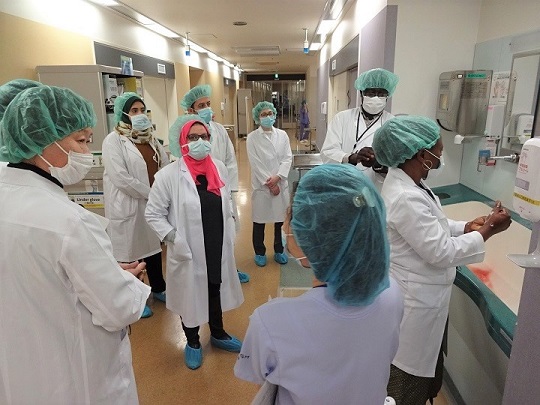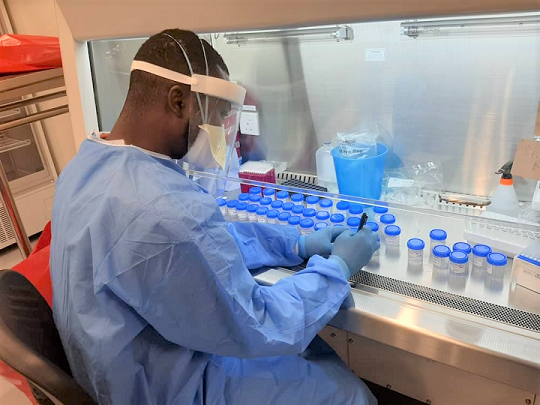[Ex-participants fighting COVID-19] Ghana: Knowledge and experience effectively being applied at Noguchi Memorial Institute for Medical Research
2020.06.12
Ex-training participants in JICA training are now confronting the COVID-19 pandemic in their respective countries. The knowledge and experience gained from the training in Japan have inevitably evolved into on-site actions in a variety of ways, including the implementation of accurate PCR testing, leading the way in effective hospital case management and supportive care to patients with COVID-19 infections. Furthermore, the ex-participants’ network in developing countries is enabling them to share their knowledge and experiences across borders via online.

Ex-participants from different countries taking part in the “Program for the Specialist of Healthcare-Associated Infection Prevention and Control” held at the National Center for Global Health and Medicine (Tokyo)
This article is the first in a five-issue series, which introduces ex-participants of JICA training programs who are active in their home countries. We start by featuring an ex-participant who is at the forefront of measures against infectious diseases at the Noguchi Memorial Institute for Medical Research (NMIMR). The institution was established about 40 years ago with Japan’s cooperation in the West African country of Ghana and has a long history of cooperation with Japan.
As of June 11, the number of people infected with COVID-19 in Ghana reached 10,201 (48 deaths), and tension is growing. Under this situation, the implementation of appropriate PCR testing is one of the most important issues, as is the case with Japan. Of the 229,093 COVID-19 PCR tests carried out to date (as of June 4), approximately 80% have been implemented by the NMIMR. Constructed in 1979 with the cooperation of Japan, it plays a central role in fighting infectious diseases in Ghana and beyond.
Christopher Zaab-Yen Abana is currently working in 24-hour work shifts as an assistant researcher at the NMIMR for PCR testing. He was a participant in “Strengthening laboratory techniques and surveillance system for global control of HIV and related infectious diseases,” implemented by JICA Tokyo in collaboration with National Institute of Infectious Diseases in 2019. The main objective of this training was for participants to acquire the knowledge and laboratory skills required for diagnosing infectious diseases.

Mr. Abana performing preparatory work for PCR test
Among the lessons learned in the training, Mr. Abana says that the 5S—Sort (Seiri), Set (Seiton), Shine (Seiso), Standardize (Seiketsu) and Sustain (Shitsuke)—Kaizen approach, which was developed in Japanese industry aiming to improve the working environment and quality management, is helping to advance the efficiency of the current testing process.
“’Sort’ allows appropriate classification of specimens suspected of being infected early in the PCR test, and accurate results can be obtained. ‘Standardize’ is an important indicator of how specimens are handled in the laboratory.” Currently, with thousands of specimens being carried out every day, he reassuringly commented, “I will continue to do my job by making use of what I have learned in the training program, such as 5S Kaizen, in order to make the flow from the receipt of specimens to testing more efficient, as well as in molecular genetic testing techniques.”
For Japan, 5S Kaizen is routine. However, in many developing countries, the spirit and working approach as prescribed in 5S Kaizen has not been thoroughly implemented. The introduction of 5S Kaizen in PCR testing not only improves the efficiency of the process but also provides incalculable effectiveness in measures such as the implementation of precise testing and the prevention of infection in laboratories.

The Advanced Research Laboratory for Infectious Diseases of NMIMR was completed in March 2019
In addition to research on infectious diseases, the NMIMR is also strengthening testing systems in Ghana at a national level by providing guidance and technical support on test methods at other medical institutions in the country. NMIMR Director, Professor Abraham Annan, says, “Without the NMIMR Advanced Research Laboratory for Infectious Diseases (where testing for COVID-19 infections is being carried out), we would not have been able to grasp the infection situation in Ghana as much as we can do now. The Laboratory is performing a vital role.”

Professor William Ampofo, Head of the NMIMR Virology Department
Professor William Ampofo, Head of the NMIMR Virology Department, which is responsible for PCR testing, frequently appears on television to inform the public of the status of the COVID-19 infection. He also focuses on activities for public awareness to prevent the disease, such as providing easy-to-understand explanations of the state of testing and testing methods in Ghana.
Professor Ampofo plays a central role in the COVID-19 multi-level task force team led by the Ghanaian President. He has previously studied at the Tokyo Medical and Dental University and is currently working with JICA on “The Project for Surveillance and Laboratory Support for Emerging Pathogens of Public Health Importance.”
To date, approximately 50 people from the NMIMR have participated in JICA training. The ex-participants are the leading members of JICA projects and research implemented at the NMIMR. Their presence is a considerable force.
As of May 15, the COVID-19 infection has been confirmed in 54 African countries, and the number of infected persons is forecasted to increase further in West Africa at a regional level. Through JICA's Third Country Training Program (TCTP), the NMIMR provides guidance on the testing of COVID-19 in nine neighboring countries (Ghana, Guinea, Côte d'Ivoire, Sierra Leone, Togo, Nigeria, Burkina Faso, Benin, and Liberia). It is expected to continue to play a leading role in the fight against infectious diseases in the region.
scroll